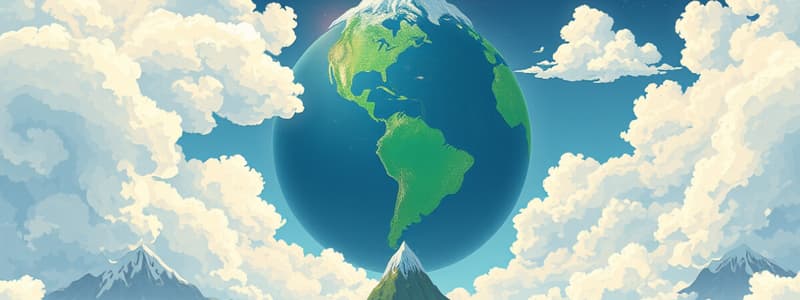Podcast
Questions and Answers
What is the primary focus of microeconomics?
What is the primary focus of microeconomics?
- The analysis of inflation and unemployment rates
- The behavior of individual consumers and businesses (correct)
- The study of the economy as a whole
- The allocation of resources by central governments
Which type of economy relies heavily on agriculture and barter systems?
Which type of economy relies heavily on agriculture and barter systems?
- Mixed Economy
- Traditional Economy (correct)
- Command Economy
- Market Economy
In which economic system do private individuals primarily own and control property?
In which economic system do private individuals primarily own and control property?
- Capitalism (correct)
- Planned Economy
- Command Economy
- Socialism
What is not considered a factor of production?
What is not considered a factor of production?
Which indicator measures the total value of goods and services produced within a country?
Which indicator measures the total value of goods and services produced within a country?
Which type of economy features minimal government intervention with decisions guided by supply and demand?
Which type of economy features minimal government intervention with decisions guided by supply and demand?
What role does labor play in the production process?
What role does labor play in the production process?
Which of the following is a characteristic of a command economy?
Which of the following is a characteristic of a command economy?
Flashcards are hidden until you start studying
Study Notes
Economics Definitions
- Economics: The study of how individuals and societies allocate scarce resources to satisfy their unlimited wants.
- Microeconomics: Focuses on individual consumers and businesses.
- Macroeconomics: Studies the economy as a whole, including inflation, unemployment, and economic growth.
Types of Economies
-
Traditional Economy:
- Based on customs and traditions.
- Relies on agriculture and barter systems.
-
Command Economy:
- Central government controls resources and production.
- Often associated with socialism or communism.
-
Market Economy:
- Decisions are made based on supply and demand.
- Little government intervention.
-
Mixed Economy:
- Combines elements of both market and command economies.
- Government and private sector play significant roles.
Economic Systems
- Pure Market System: No government intervention; operates on free market principles.
- Planned Economy: Resource allocation and production decisions are made by the government.
- Capitalism: Economic system where private individuals own and control property and businesses.
- Socialism: Economic system where the government owns and controls major means of production.
Factors of Production
- Land: Natural resources used in the production process.
- Labor: Human effort used in the production of goods and services.
- Capital: Man-made resources (machinery, tools) used for production.
- Entrepreneurship: The ability to combine land, labor, and capital to create goods and services.
Economic Growth Indicators
- Gross Domestic Product (GDP): The total value of all goods and services produced within a country in a specific period.
- Unemployment Rate: Percentage of the labor force that is jobless and actively seeking employment.
- Inflation Rate: The rate at which the general level of prices for goods and services is rising.
- Per Capita Income: Average income earned per person in a given area in a specified year.
- Standard of Living: Level of wealth, comfort, and material goods available to a certain socioeconomic class or geographic area.
Economics Definitions
- Economics studies the allocation of scarce resources to meet unlimited wants in society.
- Microeconomics examines the behaviors of individual consumers and businesses.
- Macroeconomics analyzes the economy on a broader scale, including factors like inflation, unemployment, and economic growth.
Types of Economies
- Traditional Economy relies on historical customs and agricultural practices, often utilizing barter systems.
- Command Economy features central government control over resources and production, often associated with socialism or communism.
- Market Economy operates on supply and demand dynamics with minimal government intervention in economic decisions.
- Mixed Economy blends market and command economy elements, where both government and private sectors significantly influence economic activities.
Economic Systems
- Pure Market System functions without government intervention, relying solely on free market principles.
- Planned Economy has the government making all resource allocation and production decisions.
- Capitalism allows private individuals to own and control property and businesses, encouraging competition and innovation.
- Socialism features government ownership and control of major means of production, aiming for equal distribution of resources.
Factors of Production
- Land encompasses all natural resources utilized in production processes.
- Labor refers to human efforts in producing goods and services, including physical and intellectual contributions.
- Capital includes man-made resources like machinery and tools essential for production.
- Entrepreneurship signifies the skill of combining land, labor, and capital to produce goods and services.
Economic Growth Indicators
- Gross Domestic Product (GDP) measures the monetary value of all goods and services produced within a country's borders over a designated timeframe.
- Unemployment Rate reflects the percentage of the labor force that is unemployed yet actively seeking work.
- Inflation Rate indicates the pace at which the overall price level for goods and services increases, affecting purchasing power.
- Per Capita Income represents the average income earned per person in a specific area during a specified year, serving as a measure of economic well-being.
- Standard of Living gauges the wealth, comfort, and material provisions accessible to a specific socioeconomic class or geographic region.
Studying That Suits You
Use AI to generate personalized quizzes and flashcards to suit your learning preferences.




